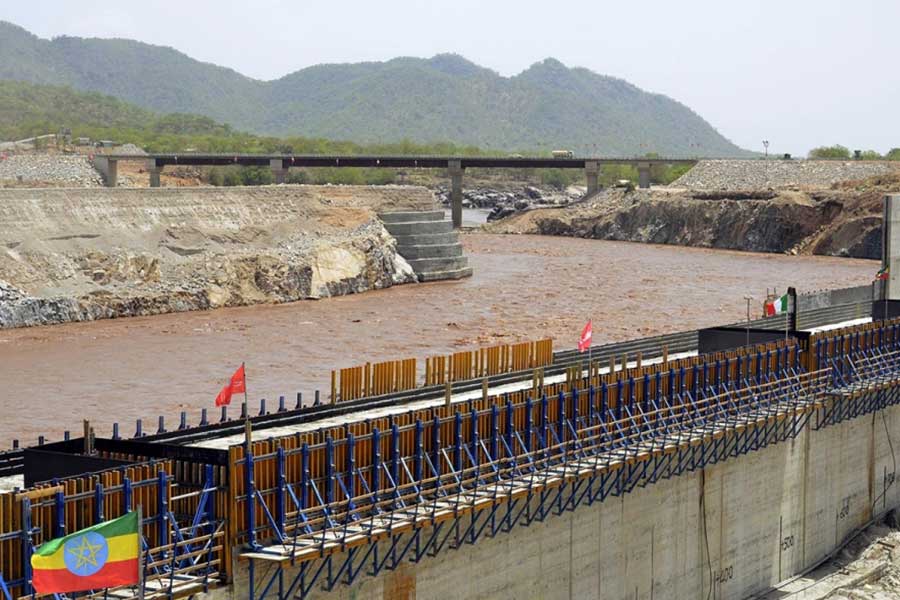
Commentaries | Jan 22,2022
May 3 , 2025
By Bjorn Lomborg
It is tempting to believe that the world is on the brink of environmental collapse. We are constantly inundated by dire predictions of climate catastrophe and warnings about the planet's imminent destruction.
But, this is misleading. Rather than spiralling into panic, we should take a moment to appreciate the remarkable progress we have made in improving the environment and acknowledge that prosperity is a key factor.
This week marked the 55th anniversary of Earth Day. Back in 1970, when it was first held, the world faced some grim environmental challenges. Rivers were catching fire, and cities were choked with smog. Air and water pollution were rampant, especially in the industrialised West. Today, outdoor air pollution has declined dramatically in rich countries. Over the past three decades, death risk from air pollution has spectacularly declined by over 70pc, while waterways have become cleaner and countries reforested.
Yet, in poorer countries, the picture is more complicated. That is because, as countries emerge from poverty, industrialisation at first increases pollution, before they become rich enough to tackle it. But, even in the developing world, progress is being made. Look at China, once notorious for its severe pollution. It is now actively cleaning up its air and water.
For the seven billion people who do not live in the rich world, outdoor air pollution became worse over the quarter of a century beginning in 1990. But, as sulfur emissions have peaked and started declining, deaths from outdoor air pollution in poor countries have actually slightly declined.
When focusing on pictures of smoggy Asian megacities, we miss the much deadlier air pollution that takes place indoors for the world's poorest people. This overlooked problem arises from energy poverty, where people are forced to rely on traditional biomass — wood, cardboard, and dung — to cook and keep warm. The World Health Organisation (WHO) estimates that 2.1 billion people live in homes that are many times more polluted than even the worst outside days in Delhi or Beijing, equivalent to each person smoking two packs of cigarettes daily.
Even today, indoor air pollution kills more than three million people each year. However, a spectacular environmental fact that almost no one celebrates is that indoor air pollution for the non-rich world has more than halved since 1990. More than four million lives are saved each year.
How did this progress happen?
Through prosperity, fewer people rely on dung and cardboard to cook and keep warm; instead, they use cleaner and better energy sources like natural gas and electricity.
Indeed, in many ways, poverty is the greatest polluter. When people are struggling to survive, environmental concerns take a backseat. As countries get richer, they can invest in cleaner technologies, regulate industries, and focus on improving public health. Prosperity not only leads to better living standards and nutrition but also makes people more resilient to environmental challenges. It also actively helps societies improve their environment.
There is a clear connection between a country's income and its environmental performance. The richer a country becomes, the better it handles its environment, as shown by Yale University's Environmental Performance Index. A society focused on economic development can lift people out of poverty, address pollution, and invest in sustainable practices.
Unfortunately, the environmental movement often ignores practical solutions, instead favouring sensationalism. Many of the environmental predictions that gained widespread attention in the 1970s turned out to be alarmist and wrong. We were told that we would run out of most resources, that overpopulation would lead to a global catastrophe, and that we would need to wear gas masks outside by the year 1985.
None of these predictions materialised, but they nonetheless fueled a culture of fear and misallocation of resources.
We are seeing this pattern repeat today, particularly when it comes to climate change.
Yes, climate change is a real challenge, but we should keep it in perspective. It is not the existential threat that some would have us believe. In fact, over the past century, deaths from climate-related disasters such as storms, floods, droughts, and wildfires have declined by a remarkable 98pc. This is not because the environment has remained static, but because human innovation and adaptation have made us more resilient.
The reality is that we are not on the precipice of doom. Instead of being scared by sensationalist rhetoric into spending trillions of dollars on poor climate policies, we should focus on practical and smart solutions that can make a real difference. In the case of climate change, this means investing in green energy innovation. When it comes to one of the world's biggest environmental challenges, we should end indoor air pollution and save three million lives each year, mostly through prosperity and access to clean, cheap, and reliable energy.
Rather than panicking about the environment, let us celebrate the immense progress we have made and will continue to make, as long as prosperity lasts.
PUBLISHED ON
May 03,2025 [ VOL
26 , NO
1305]


Commentaries | Jan 22,2022

Viewpoints | Apr 10,2023

Radar | May 28,2022

Commentaries | Jul 13,2024

Radar | Feb 04,2023

Advertorials | Sep 04,2023

Fortune News | Oct 24,2020

My Opinion | Apr 24,2021

Viewpoints | Sep 08,2024

My Opinion | Nov 13,2021

Photo Gallery | 178756 Views | May 06,2019

Photo Gallery | 168953 Views | Apr 26,2019

Photo Gallery | 159795 Views | Oct 06,2021

My Opinion | 137109 Views | Aug 14,2021
Commentaries | Oct 25,2025

Dec 22 , 2024 . By TIZITA SHEWAFERAW
Charged with transforming colossal state-owned enterprises into modern and competitiv...

Aug 18 , 2024 . By AKSAH ITALO
Although predictable Yonas Zerihun's job in the ride-hailing service is not immune to...

Jul 28 , 2024 . By TIZITA SHEWAFERAW
Unhabitual, perhaps too many, Samuel Gebreyohannes, 38, used to occasionally enjoy a couple of beers at breakfast. However, he recently swit...

Jul 13 , 2024 . By AKSAH ITALO
Investors who rely on tractors, trucks, and field vehicles for commuting, transporting commodities, and f...

Oct 25 , 2025
The regulatory machinery is on overdrive. In only two years, no fewer than 35 new pro...

Oct 18 , 2025
The political establishment, notably the ruling party and its top brass, has become p...

Oct 11 , 2025
Ladislas Farago, a roving Associated Press (AP) correspondent, arrived in Ethiopia in...

Oct 4 , 2025
Eyob Tekalegn (PhD) had been in the Governor's chair for only weeks when, on Septembe...

Oct 25 , 2025 . By YITBAREK GETACHEW
Officials of the Addis Abeba's Education Bureau have embarked on an ambitious experim...

Oct 26 , 2025 . By YITBAREK GETACHEW
The federal government is making a landmark shift in its investment incentive regime...

Oct 29 , 2025 . By NAHOM AYELE
The National Bank of Ethiopia (NBE) is preparing to issue a directive that will funda...

Oct 26 , 2025 . By SURAFEL MULUGETA
A community of booksellers shadowing the Ethiopian National Theatre has been jolted b...